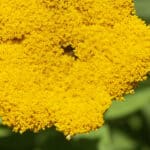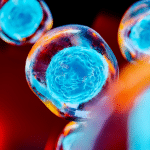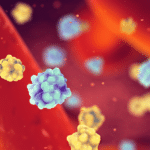Bears are among the most massive and powerful animals on earth. They are also very intelligent. They can use tools, they have a remarkably acute sense of smell, good eyesight and hearing, and they hibernate during inhospitable winters when the pickings are slim for food.
Hibernating brown bears will stay in their dens for up to seven months without eating or drinking. Somehow their bodies recycle waste without having to urinate or defecate. Their metabolism and heartbeat slow down considerably as they enter a not-quite-deep-sleep state known as “torpor” that enables a bear to sense environmental stimuli without becoming aroused. How is this possible?
Metabolic Flexibility
A recent report in Frontiers in Zoology sheds new light on the metabolic flexibility of animals that hibernate. A team of scientists from Norway, Sweden, and France have identified seasonal shifts in the endocannabinoid system (ECS) of brown bears, which drive physiological adaptation during hibernation. The ECS regulates key biological processes – including food intake, energy storage and expenditure, sleep patterns, respiration, and heart rate – that contribute to the metabolic, behavioral, and circadian adjustments that occur while animals hibernate.
Changes in endocannabinoid tone had previously been documented in smaller animals that hibernate, but not in large-bodied hibernators. According to Boyer et al (2020), the global downregulation of the ECS in hibernating brown bears involves alterations in circulating endocannabinoids and other lipid neurotransmitters, as well as in cannabinoid receptor activity and ECS-related gene expression.
The European researchers documented specific seasonal variations in the fatty acid composition of winter-hibernating bears compared to summer-active bears. During hibernation, brown bears experience:
- Reduced CB1 and CB2 receptor signaling in muscle and adipose tissue, respectively.
- Lower levels of anandamide and 2AG (the two major endocannabinoids) in muscle and adipose tissue.
- Elevated serum levels of DHA [docosahexaenoic acid], an omega-3 fatty acid essential for healthy brain function.
- A threefold increase in the plasma concentration of OEA [oleoylethanolamide], an endocannabinoid-like compound, which suppresses hunger.
OEA & PPAR-alpha
In terms of its molecular structure, OEA is a lipid compound closely related to anandamide (N-arachidonoylethanolamine), but unlike anandamide it acts independently of ECS pathways. OEA is an endogenous, high-affinity agonist (activator) of PPAR-alpha, a receptor on the surface of the cell’s nucleus, which regulates feeding and body weight.
Whereas anandamide boosts appetite by binding to CB1 (the “munchies” receptor), OEA decreases food intake by binding to PPAR-alpha. OEA also stimulates lipolysis, a metabolic process that mobilizes stored energy by converting fat to fuel via fasting-induced ketogenesis.
The combination of reduced CB1 activity and heightened OEA plasma concentration enables hibernating brown bears to sustain themselves without eating during months of torpor – while also maintaining the capacity to sense stimuli from the environment.
The European scientists surmised that “beyond an overall suppression of the ECS, seasonal shift in endocannabinoid compounds could be linked to bear’s peculiar features that include hibernation without arousal episodes and capacity to react to external disturbance.”
“Don’t Poke the Bear”
There’s an old saying – “Don’t poke the bear” – which actually applies more to humans than big, furry beasts that hibernate. It’s a blunt warning not to deliberately provoke or antagonize someone who might become angry or violent, especially someone with a quick temper who’s in a position of power or authority.
Perhaps people would respond less to pokes if we were more like bears who don’t react to external disturbance when they’re hibernating. But we aren’t hibernators, and we can’t sleep through what’s shaping up to be a terrible winter with COVID raging, deaths mounting, and hunger spreading around the world.
Apparently, we are not as adaptable as our hominid ancestors who endured ferocious winters and food scarcity “by slowing down their metabolisms and sleeping for months,” according to a recent paper published in L’Anthropologie (Arsuaga and Bartsiokas, December 2020).
In this article, two archeologists analyzed the fossilized remains of early humans found in Spain, which showed seasonal variations in bone growth indicative of animals that hibernate. The researchers acknowledge that it “may sound like science fiction,” but they note that many mammals, including lemurs and a few other primates, are known to hibernate: “This suggests that the genetic basis and physiology for such a hypometabolism could be preserved in many mammalian species including humans.”
Based on this newly unearthed archeological evidence, scientists postulate that early humans in Europe were able to access “metabolic states that helped them to survive for long periods of time in frigid conditions with limited supplies of food and enough stores of body fat.” In other words, they hibernated.
Martin A. Lee is the director of Project CBD. He’s authored and edited several books, including Smoke Signals, Acid Dreams, and The Essential Guide to CBD. © Copyright, Project CBD. May not be reprinted without permission.
Sources
- Antonis Bartsiokas, Juan-Luis Arsuaga, “Hibernation in hominins from Atapuerca, Spain half a million years ago,” L’Anthropologie, Volume 124, Issue 5, 2020 (online 27 November 2020). https://www.sciencedirect.com/science/article/abs/pii/S0003552120300832
- Christian Boyer, et al, “Specific Shifts in the endocannabinoid system in hibernating brown bears,” Frontiers in Zoology, 2020 Nov 23. https://www.ncbi.nlm.nih.gov/pmc/articles/pmid/33292302/
- Robin McKie, “Early humans may have survived the harsh winters by hibernating,” The Guardian (UK), 20 Dec 2020. https://www.theguardian.com/science/2020/dec/20/early-humans-may-have-su…
Recommended Readings
The Endocannabinoid System
CBD offers hope for a non-toxic therapy to treat aggressive cancer without the painful side effects of chemotherapy.
Diet & the Endocannabinoid System
New research on how the ECS impacts hunger, diet, digestion, and energy metabolism.
How CBD Works
Learn how CBD works with your body’s endocannabinoid system.











